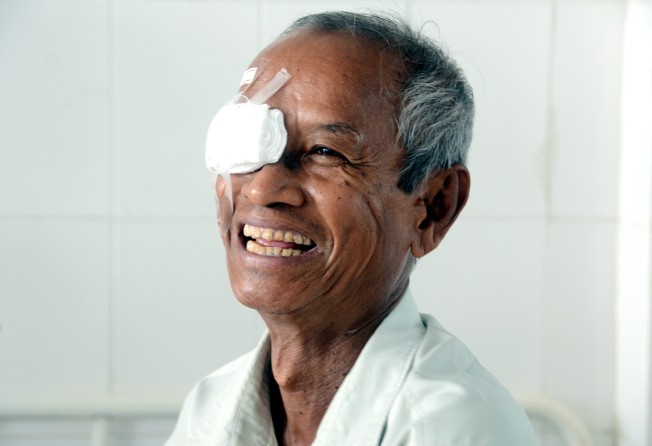
For eye surgeon Fred Hollows' widow, battle to help blind in Asia goes on
Hollows saved the sight of tens of thousands in his native Australia and around Asia. More than 20 years after his death, the foundation he and wife Gabi founded has come to Hong Kong to step up the fight to cure blindness - something it can do for just HK$150 a head - writes Kylie Knott


STARTING OUT I was born in Newcastle (in Australia). My parents bought a farm and they wanted to give their kids a country lifestyle. Our family was Catholic on my father's side. My mother was not raised Catholic so she converted to marry my father. When I was little I was very cross-eyed so I had my first ophthalmologist visit before I was three years old. Over the years, I visited many ophthalmologists in Newcastle.
I'm proud to have been born on May 21, 1953, in the same month that Sherpa Tenzing and Sir Edmund Hillary reached the top of Mount Everest. I've always been connected to the Himalayas, but never in my wildest dreams thought I'd marry a mountaineer and forge a close relationship with the Nepalese people.

LOVE IN HER SIGHTS I met Fred Hollows (the renowned eye surgeon and humanitarian) on my first morning of optic lectures at the Prince of Wales Hospital, in Sydney. The government-backed National Trachoma and Eye Health Programme was in its early stages in 1975 and I was lucky to be invited to work with Fred on the project. I was about 22 and felt privileged to be a young white girl in remote Australia with our beautiful indigenous people. In three years, we visited 465 communities and saw about 112,000 people. It was life-changing for me, not just because I fell in love with Fred (they married in 1980, and had five children together).
We've restored sight to more than two million people ... but with four out of five blind people in developing countries still needlessly blind, there's still a lot of work to do
Australia was just the beginning - Fred was invited overseas to work on other blindness-prevention programmes in Southeast Asia and one of the first places he was invited to was Nepal. So I joined him and, with our family, we also travelled to Myanmar, Thailand and Bangladesh on a mission to end avoidable blindness. Fast-forward to today and we're still fighting blindness in Australia. The indigenous people have cataract blindness but also have a blinding disease called trachoma - Australia is the only first-world country that still has active trachoma. So you have to keep looking at it - chipping away at the coal face - following up and revisiting. If the living conditions are poor and the housing hardware not good, and you don't have hot and cold running water for ablutions and face washing, then trachoma will exist. Diabetes is also a big problem in the indigenous communities. And if you're a diabetic then one thing that happens is you have changes at the back of the retina, and haemorrhaging, and you can go blind from that.


China has the highest burden of avoidable blindness in the world
BREAKING THE CYCLE Since the foundation began we've restored sight to more than two million people - often with a simple 20-minute operation. We work in more than 25 countries but with four out of five blind people in developing countries still needlessly blind, there's still a lot of work to do. We can save someone's sight for as little as HK$150.

For more information, visit www.hollows.org/hk/home.